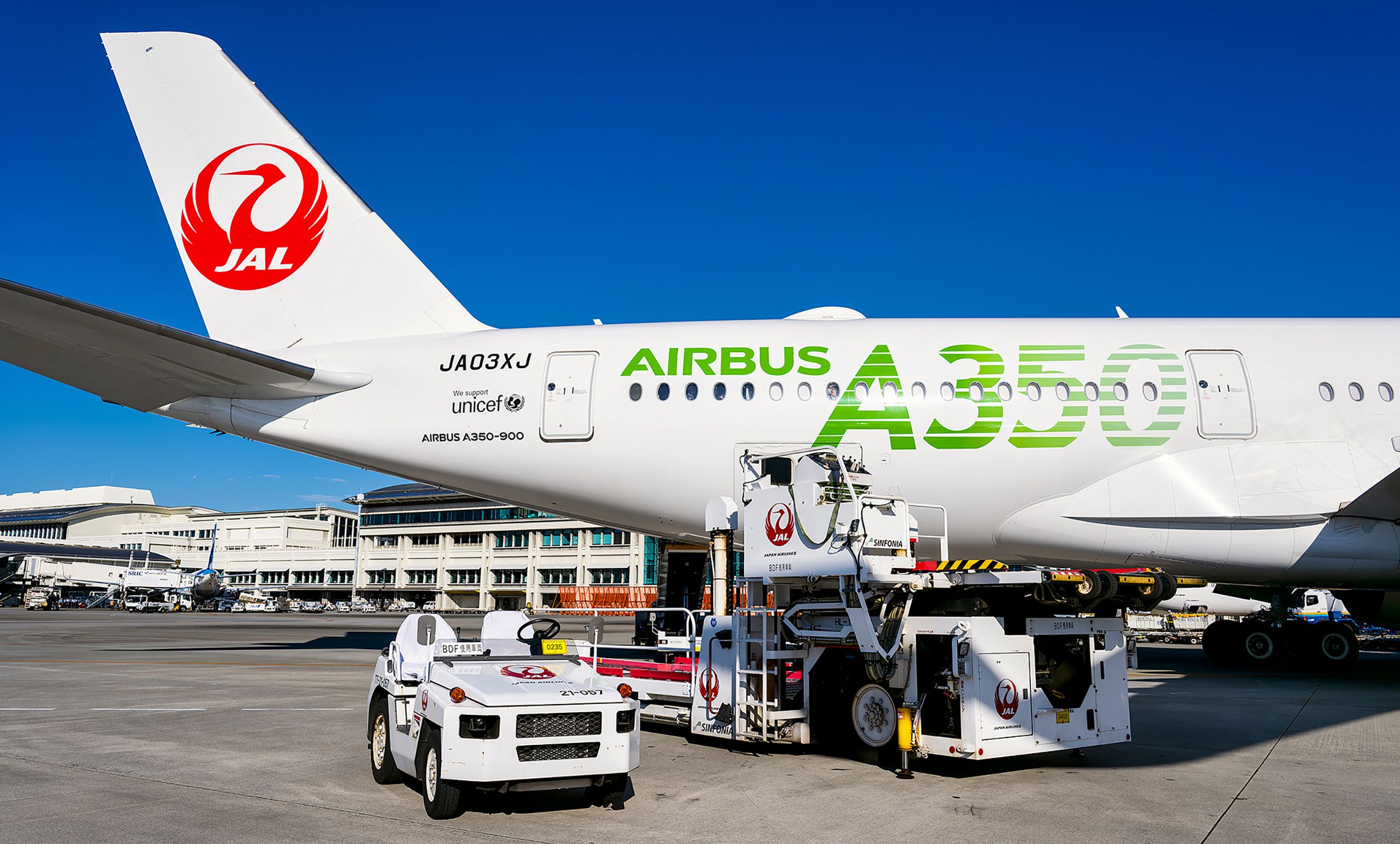JAPAN AIRLINES SETS ITS SIGHTS ON A SUSTAINABLE FUTURE

Today we are in the age of demand for sustainable travel and eco-tourism. In tandem, industries across categories of aviation and travel are challenged to find solutions to actualize the needs of today’s conscious consumer. Ahead of April’s Global Earth Month, Japan Airlines shares its vision for a world where global citizenship to protect the environment works in harmony with transportation, including aviation. The airline’s 2050 initiative is a multi-tiered 30-year roadmap positioning the carrier as a leader of sustainable responsibility within the aviation field.
With many avenues to consider, Japan Airlines is focusing on 22 priority sustainability issues through an ESG model (environmental, social, and governance) with many items falling under the 4Rs methodology (refuse/reduce/reuse/recycle). Topics include addressing CO₂ emissions, usage of sustainable materials including Sustainable Aviation Fuel (SAF), reduction of plastic single use items, and the elimination of food loss and waste.
REDUCING CO₂ EMISSIONS
In June 2020, Japan Airlines announced its commitment to reducing total CO₂ emissions by 10% by 2030 and to achieve net zero CO₂ emissions by 2050. Various programs are being initiated including upgrading to more fuel-efficient aircraft, supporting the development and use of sustainable aviation fuel, and reducing daily operations’ carbon footprint. Through this approach and with the cross-organizational efforts, the airline can proudly share the achievement of reducing 142,300 tons of CO₂ emissions in daily operations in 2021, contributing to an overall 1.5% reduction of total CO₂ emissions in the same year.
Fuel-efficient Boeing 787s and Airbus A350s are upgrading Japan Airlines’ fleet to meet its commitment of 85% utilization of fuel-efficient aircraft by 2025. One such Japan Airlines Airbus A350-900 debuted Japan’s first fully net zero passenger charter flight in November 2022 from Tokyo (Haneda) to Okinawa (Naha).
With many avenues to consider, Japan Airlines is focusing on 22 priority sustainability issues through an ESG model (environmental, social, and governance) with many items falling under the 4Rs methodology (refuse/reduce/reuse/recycle).

SUSTAINABLE AVIATION FUEL
When approaching the need for dramatic reduction of CO₂ emissions, action must be directed to the adoption of Sustainable Aviation Fuel (SAF). Japan Airlines has committed to replace 10% of all onboard fuel with SAF by 2030.
In March 2022, Japan Airlines jointly established the “ACT FOR SKY,” a voluntary organization dedicated to promoting, commercializing, and expanding the use of domestic Japanese-produced SAF. Prior to the establishment of “ACT FOR SKY,” Japan Airlines had already been extensively exploring sustainable fuel solutions made from a variety of sustainable feedstock including camelina, woodchips, donated used cotton clothing, and microalgae, and had successfully supplied them on Japan-domestic and international flights beginning in 2009. Japan Airlines is also a proud member of the World Economic Forum’s #CleanSkies4Tomorrow whose goals include powering global aviation with 10% SAF by 2030.
Additionally, Japan Airlines has invested in California-based Fulcrum BioEnergy, Inc., marking the first investment by a Japanese company in a Sustainable Aviation Fuel production business. The airline has also signed agreements and MOUs with additional renewable fuel producers.
ELIMINATING SINGLE USE PLASTICS & USING ENVIRONMENTALLY-FRIENDLY MATERIALS
For passengers, a tangible area of sustainability is the airline’s attention to the usage of single use plastics both on and off the aircraft. With Japan reported as the second highest country per capita emissions of disposable plastics globally, addressing the issue of single use plastics was of importance to the airline. Through the promotion of a 3Rs +1 (reduce, reuse, recycle + redesign) approach towards plastic usage, Japan Airlines set a goal of eliminating all new petroleum-derived single-use plastics in the cabins and lounges, and changing 100% of single-use plastics used in airports and cargo to environmentally friendly materials by 2025. The airline is also a participant in the “Plastic Circular Challenge 2025” organized by the worldwide fund for Nature Japan (WWF Japan).
Japan Airlines has redefined the brand’s internal definition of “growth” to “enhancement of corporate values.” This includes attention and solution-based support of social issues to realize a future without barriers for discovery and exploration of planet Earth.

USING INGREDIENTS WITH LOW ENVIRONMENTAL IMPACT & REDUCING FOOD WASTE
Japan Airlines also champions reduction of food loss and waste through JAL’s FLW: Food Loss & Waste program. For example, JAL Business Class inflight menus on some routes are designed to incorporate ingredients that have low environmental impact. The airline also offers a proactive choice for its customers to apply in advance for the “Meal Skip Option” should they wish to rest or just opt-out of the meal service on their flight. The voluntary program is offered on all routes and works to provide a quick, easy way for customers to support the reduction of food waste, and the airline will donate to the TABLE FOR TWO program for each customer that applies for the service.
Additionally, JAL Royal Catering – an inflight meal manufacturing subsidiary – is also taking steps to address culinary waste that naturally occurs within meal preparation. While sights were aimed to recycle all cooking residue by 2025, 100% recycling of all cooking residue was realized by June 2022. Currently cooking residue created at the catering company is composted and for use by farmers in Japan. Creating a “circular economy” model, “recycling-oriented” vegetables grown in compost produced from vegetable waste are being utilized within Japan Airlines’ inflight meals.
WORKING TOWARDS A BRIGHTER FUTURE
Japan Airlines has redefined the brand’s internal definition of “growth” to “enhancement of corporate values.” This includes attention and solution-based support of social issues to realize a future without barriers for discovery and exploration of planet Earth.
With Japan Airlines’ vast and varied commitments being implemented fully by 2050, a compatible balance of both behind the scenes and consumer-facing initiatives are shaping the future where commerce, global citizenship, and sustainability are in harmony.
Skies are truly not the limit for Japan Airlines’ sustainability efforts.

